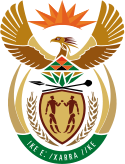- High Courts of South Africa
-
South Africa 
This article is part of the series:
Politics and government of
South Africa- Parliament
- National Council of Provinces
- Chairperson
- National Assembly
- Speaker
- Leader of the Opposition
- Helen Zille (national)
- Lindiwe Mazibuko (parliament)
- National Council of Provinces
- Chief Justice
- Pres. of Supreme Court of Appeal
- Lex Mpati
- Courts
Other- Political parties
- Foreign relations
- Taxation
 A crowd outside the Johannesburg High Court during the Jacob Zuma rape trial.
A crowd outside the Johannesburg High Court during the Jacob Zuma rape trial.
The High Courts are superior courts of law in South Africa. The courts were created in 1996 on the adoption of the Constitution of South Africa, and inherited the jurisdiction of the provincial and local divisions of the former Supreme Court of South Africa. High Courts have general jurisdiction over defined geographical areas in which they are situated, and the decisions of the High Courts are binding on magistrates' courts within their areas of jurisdiction. The High Courts have jurisdiction over all matters in their geographical area, but they usually only hear civil matters involving more than 100,000 rand, and serious criminal cases. They also hear any appeals or reviews from lower courts (magistrates’ courts) which fall in their geographical jurisdiction. The High Courts usually hear any matter involving a person’s status (for example, adoption, insolvency).
Important officers in a High Court
Each High Court is headed by a Judge President. The registrar keeps all the official court documents. The family advocate must be consulted on all matters involving children, as the High Court is the "upper guardian" of all children in South Africa. The Master of the High Court keeps all the records relating to people’s estates (deceased or insolvent). The Sheriff delivers certain documents to the parties in a civil case, and also attaches property when a warrant is issued. The Director of Public Prosecutions, who used to be called the Attorney-General, is responsible for criminal prosecutions by the state. The State Attorney is the lawyer who represents the state in civil actions (where the state is suing or being sued).
Provincial divisions
There are at the moment thirteen High Courts. The Renaming of High Courts Act, 2008 replaced the old apartheid-era names of the divisions. When the rationalisation of the legal system is completed by the passage of the Superior Courts Bill, the multiple courts in provinces that have them will be merged into "seats" of a single court. The exception to this is Gauteng, in which the separate North and South Gauteng High Courts will remain, due to the high number of cases generated by the presence of the national government in Pretoria (North Gauteng) and the country's commercial hub in Johannesburg (South Gauteng).
The present thirteen High Courts are:
Province Court Previous name Eastern Cape Eastern Cape High Court, Bhisho Ciskei Division Eastern Cape High Court, Grahamstown Eastern Cape Division Eastern Cape High Court, Mthatha Transkei Division Eastern Cape High Court, Port Elizabeth South-Eastern Cape Local Division Free State Free State High Court, Bloemfontein Orange Free State Division KwaZulu-Natal KwaZulu-Natal High Court, Durban Durban and Coast Local Division KwaZulu-Natal High Court, Pietermaritzburg Natal Provincial Division Gauteng North Gauteng High Court, Pretoria Transvaal Provincial Division South Gauteng High Court, Johannesburg Witwatersrand Local Division Limpopo Limpopo High Court, Thohoyandou Venda Division North West North West High Court, Mafikeng Bophuthatswana Division Northern Cape Northern Cape High Court, Kimberley Northern Cape Division Western Cape Western Cape High Court, Cape Town Cape of Good Hope Provincial Division (The province of Mpumalanga currently has no High Court and falls within the jurisdiction of the North Gauteng High Court in Pretoria.)
Circuit Court
Circuit Courts are also part of the High Court. They sit at least twice a year, moving around to serve more rural areas.
Supreme Courts of Africa Sovereign
states- Algeria
- Angola
- Benin
- Botswana
- Burkina Faso
- Burundi
- Cameroon
- Cape Verde
- Central African Republic
- Chad
- Comoros
- Democratic Republic of the Congo
- Republic of the Congo
- Côte d'Ivoire (Ivory Coast)
- Djibouti
- Egypt
- Equatorial Guinea
- Eritrea
- Ethiopia
- Gabon
- The Gambia
- Ghana
- Guinea
- Guinea-Bissau
- Kenya
- Lesotho
- Liberia
- Libya
- Madagascar
- Malawi
- Mali
- Mauritania
- Mauritius
- Morocco
- Mozambique
- Namibia
- Niger
- Nigeria
- Rwanda
- São Tomé and Príncipe
- Senegal
- Seychelles
- Sierra Leone
- Somalia
- South Africa
- South Sudan
- Sudan
- Swaziland
- Tanzania
- Togo
- Tunisia
- Uganda
- Zambia
- Zimbabwe
States with limited
recognition- Sahrawi Arab Democratic Republic
- Somaliland
- Parliament
Wikimedia Foundation. 2010.
